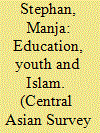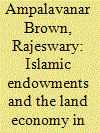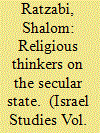|
|
|
Sort Order |
|
|
|
Items / Page
|
|
|
|
|
|
|
| Srl | Item |
| 1 |
ID:
101298


|
|
|
|
|
| Publication |
2010.
|
| Summary/Abstract |
This article attempts to explain the growing popularity of private religious lessons in urban Tajikistan from a cross-generational perspective. By instilling discipline and good 'morals', religious lessons serve as a powerful tool to socialize adolescent and morally vulnerable urban youth into the established social order. The increasing demand for religious instruction on the part of Muslim parents not only reflects the growing importance of Islam in Tajikistan, but also highlights the weaknesses of state education and the constraints on family upbringing in neo-local urban households. By attending religious classes, male and female youth have found a space for negotiating religious identities and for realizing their own abilities and ambitions. Given the socio-economic hardships of everyday life in the post-Soviet city, a turn to Islam can promote integration, recognition and social mobility, and offer an alternative route for urban youth to become 'adults'.
|
|
|
|
|
|
|
|
|
|
|
|
|
|
|
|
| 2 |
ID:
085886


|
|
|
|
|
| Publication |
2008.
|
| Summary/Abstract |
This paper emphasizes the deeply embedded economic interests of Islamic charities: the accumulation of land and property, commercial and financial activities, rather than their role in providing social welfare, educational opportunities, and facilities for individuals to perform the Hajj. These entrepreneurial priorities are global, since the waqf (Islamic endowment) is linked to the homeland of the founders in the Hadhramaut and to Saudi Arabia. The paper appraises the application and success of Islamic finance in the commercial exploitation of these assets. The focus then shifts to the role of shari'a law in determining and shaping the issuance of bonds and derivatives. Throughout the paper, attention is given to the nature of an 'ethical capitalism' that emerges, and a brief comparison is drawn with the Chinese or Confucianist Tong (lineage).
|
|
|
|
|
|
|
|
|
|
|
|
|
|
|
|
| 3 |
ID:
120725


|
|
|
|
|
| Publication |
2013.
|
| Summary/Abstract |
As Muslim communities reassert themselves in public life across the world, including Central Asia, their actions are causing tension in relations with 'secular' governments. Various global theories have been offered to explain these dynamics. According to one theory, tension between religious communities and secular states is caused by the exclusion or marginalization of Muslims, a process exacerbated by the perceived anti-Muslim bias in the foreign- and domestic-security policies of Central Asian states. A second view is that tension results from the work of global extremist groups espousing the restoration of an Islamic Caliphate. The third approach presents the rising tension as part of a broader trend: a putative clash of Western and Muslim civilizations. This article challenges these theories by using a case study of a Muslim grassroots protest in Kyrgyzstan to highlight the importance of local politics, namely informal arrangements among local officials, power brokers and community members. In so doing, it seeks to make a contribution to theorizing Muslim-state relations in Central Asia.
|
|
|
|
|
|
|
|
|
|
|
|
|
|
|
|
| 4 |
ID:
112444


|
|
|
| 5 |
ID:
128900


|
|
|
|
|
| Publication |
2013.
|
| Summary/Abstract |
Over the last 30 years or so, the Enlightenment derived pattern on the secular state and 1960s modernization theories have proved themselves obsolete with regard to the understanding of political developments. As a result, scholar have attempted to unpack the variable the complex nexus between the temporal and sacred realms in Europe.
|
|
|
|
|
|
|
|
|
|
|
|
|
|
|
|
| 6 |
ID:
098996


|
|
|
|
|
| Publication |
2010.
|
| Summary/Abstract |
This article explores the complexities of the interaction between politics, religion and gender equality in contemporary Mexico, by analysing recent developments in public debate, legal changes and implementation of government policies in two areas: 1) the inclusion of emergency contraception in public health services in 2004; and 2) the decriminalisation of abortion in Mexico City in 2008, which was followed by a massive campaign to re-criminalise abortion in the federal states. Three main findings emerge from our analysis: first, that women's sexual and reproductive autonomy has become an issue of intense public debate that is being addressed by both state-public policy and society; second, that the gradual democratisation of the Mexican political system and society is forcing the Catholic Church to play by the rules of democracy; and third, that the character and nature of the Mexican (secular) state has become an arena of intense struggle within which traditional political boundaries and ideologies are being reconfigured.
|
|
|
|
|
|
|
|
|
|
|
|
|
|
|
|
| 7 |
ID:
084923


|
|
|
| 8 |
ID:
097791


|
|
|
|
|
| Publication |
2010.
|
| Summary/Abstract |
This article analyzes the politics of preaching in Turkey in the last decade by focusing on the appointment of women as preachers and vice-muftis by the Turkish Presidency of Religious Affairs (Diyanet), a state institution established for the protection of secular foundations through religious service. It asks what happens when women wearing headscarves become civil servants and give religious guidance in a secular state, which prohibits headscarves in public offices and schools. It shows that the context, the use and the interlocutors of preaching make ordinary religious activity a complicated political practice that interacts with gender, ethnicity and state sovereignty. It argues that exceptional integration of headscarved women into public offices would seem to be an achievement given the long lasting political activism of women over the headscarf, but in the final analysis it serves the sovereign power of the state, which aims to absorb both Islamist and Kurdish challenges by mobilizing women preachers.
|
|
|
|
|
|
|
|
|
|
|
|
|
|
|
|
| 9 |
ID:
106948


|
|
|
|
|
| Publication |
2011.
|
| Summary/Abstract |
Nearly one-third of Turkey's official preaching workforce are women. Their numbers have risen considerably over the past two decades, fueled by an unforeseen feminization of higher religious education as well as the Directorate of Religious Affairs' attempts to redress its historical gender imbalances. Created in the early Turkish Republic, the Directorate is also historically embedded in (re)defining the appropriate domains and formations of religion, and the female preachers it now employs navigate people's potent fears rooted in memories of this fraught past. In the various neighborhoods of Istanbul, these preachers attempt to overcome conservative Muslims' cautious ambivalence toward the interpretative and disciplinary powers of a secular state as well as assertive secularists' discomfort and suspicion over increasingly visible manifestations of religiosity. Thus, the activities of state-sponsored female preachers are inescapably intertwined with the contestation of religious domains and authority in the secular Republic of Turkey and demonstrate an intricate interplay between the politics of religion, gender, and secularism in contemporary Turkish society.
|
|
|
|
|
|
|
|
|
|
|
|
|
|
|
|
|
|
|
|
|